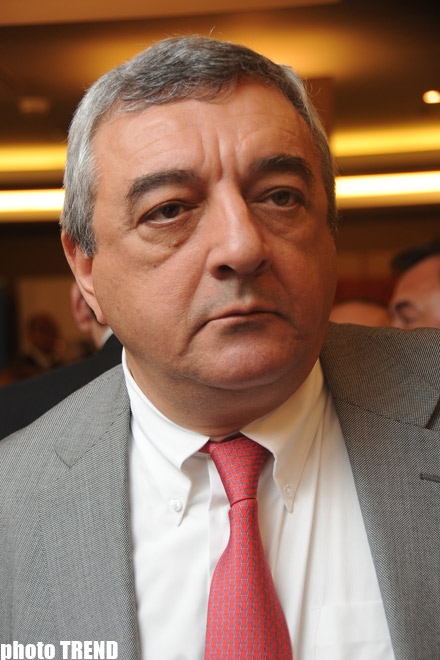Azerbaijan, Baku, March 29 / Trend , S.Agayeva/
Azerbaijan's permanent representation to the UN distributed a letter of reply to a letter from the permanent representation of Armenia to the UN regarding the Khojaly events.
The letter reflects the cruelty of the armed forces of Armenia against Azerbaijani civilians, the views of foreign media representatives, who witnessed the atrocity committed by Armenian armed forces against civilians, and the views of the Armenian servicemen and intellectuals, who participated in the slaughter, press service of Azerbaijani Foreign Ministry reported.
"I would like to draw your attention to the letter dated 24 February 2010 from the Permanent Representative of the Republic of Armenia to the United Nations, contained in document A/64/680-S/2010/102. This letter, which purports to respond to my letter addressed to you in connection with the eighteenth anniversary of an unprecedented massacre of the Azerbaijani population in the town of Khojaly (A/64/658-S/2010/78 of 8 February 2010), is not a single example of sophisticated and blatant falsification, by means of which the Armenian side attempts to deny its responsibility for the serious crimes committed during the aggression against Azerbaijan," the permanent representative of Azerbaijan to the UN, ambassador Agshin Mehdiyev said in his letter.
"The Armenian side feigns ignorance of the fact that its responsibility for the brutal killings during one night from 25 to 26 February 1992 of 613 residents of Khojaly is recognized and documented by numerous independent sources, eyewitnesses of the tragedy, as well as admitted by Armenia's high-ranking officials and public sources," the letter says.
"Thus, the Permanent Representative of the Republic of Armenia omits clarifying the words of his country's then defence minister and current President, Serzh Sargsyan, who unequivocally admitted culpability for extermination of the inhabitants of Khojaly (Thomas de Wall, Black Garden. Armenia and Azerbaijan through Peace and War (New York and London: New York University Press, 2003), p. 172), as well as the revelations of another Armenian author who gave a detailed account of how Armenian soldiers had been killing the residents of Khojaly (Markar Melkonian, My Brother's Road. An American's Fateful Journey to Armenia (London and New York: I. B. Tauris, 2005), pp. 213-214)," the diplomat says in his letter.
"The Permanent Representative of the Republic of Armenia refers to ambiguous, politically motivated and groundless interpretations of the events in Khojaly, according to which the Azerbaijanis themselves allegedly "prevented the evacuation of the local civilian population from the military operation zone" and "the Azerbaijani militia shot those who attempted to flee" in order "to utilize civilian losses of such a magnitude" for internal political purposes. It is no coincidence that such a preposterous idea immediately collapses like a house of cards under the weight of evidence testifying of a situation diametrically opposite to that represented by the Armenian side," Mehdiyev said.
According to Mehdiyev, the Armenian propaganda is not fastidious about any means it uses in attempts to enlist at least a kind of support to its cynical allegations. Thus, while manipulating the content of the Helsinki Watch report of 1992, the Permanent Representative of the Republic of Armenia seems to have forgotten that this non-governmental human rights organization had officially responded to the gross misinterpretation of its position by the Armenian side.
Furthermore, the letter of the Permanent Representative of the Republic of Armenia is yet another illustration of the Armenian side's "forgetfulness" as to the chronology of events pertaining to the beginning of the present-day stage of the conflict between Armenia and Azerbaijan, Mehdiyev said. According to him, thus, the Armenian side passes over in silence that the events in some Azerbaijani cities, notably in Sumgait on 26-28 February 1988, were preceded by a number of illegal declarations and decisions taken with a view to securing the unilateral secession of Nagorno-Karabakh from Azerbaijan, attacks at the end of 1987 on the Azerbaijanis in Khankandi (during the Soviet period - Stepanakert) and Armenia, resulting in a flood of Azerbaijani refugees and internally displaced persons who were directed, among other places, to Sumgait. It must be also recalled that on the eve of disturbances in Sumgait, namely on 22 February 1988, near the settlement of Asgaran on the Khankandi-Aghdam highway, the Armenians opened fire on a peaceful demonstration, killing two Azerbaijani youths.
"While trying to qualify the events in Sumgait as either "pogroms" or "massacre" against Armenians, the Armenian propaganda at the same time prefers not to mention at all a number of circumstances that are of vital importance in elucidating the true causes of these events. Indeed, on 26-28 February 1988, 26 Armenians and Azerbaijanis were killed in Sumgait. It is notable that one of the leading figures in these disturbances was a certain Edward Grigorian, an Armenian and native of Sumgait, who was directly involved in the killings and violence against the Armenians," the letter says.
"Whereas it has been internationally recognized that the occupation by force of the Nagorny Karabakh region and adjacent areas of Azerbaijan and the ethnic cleansing of the captured territories constitute a flagrant breach by the Republic of Armenia of its obligations under international law, it is curious that the Armenian propaganda continues to qualify the aggression against Azerbaijan as "a peaceful demand of the Nagorno-Karabakh people to exercise its right to self-determination"," the permanent representative of Azerbaijan says.
"The Government of the Republic of Azerbaijan made it clear more than once, and I am instructed to point it out once again, that Armenia's claims to the application of the principle of self-determination are contrary to and unsustainable in international law. Otherwise, this would be tantamount to accepting the results of a violation of fundamental norms of international law, including, in particular, those relating to the most serious international crimes as well as a rule prohibiting the use of force," Mehdiyev concluded.






